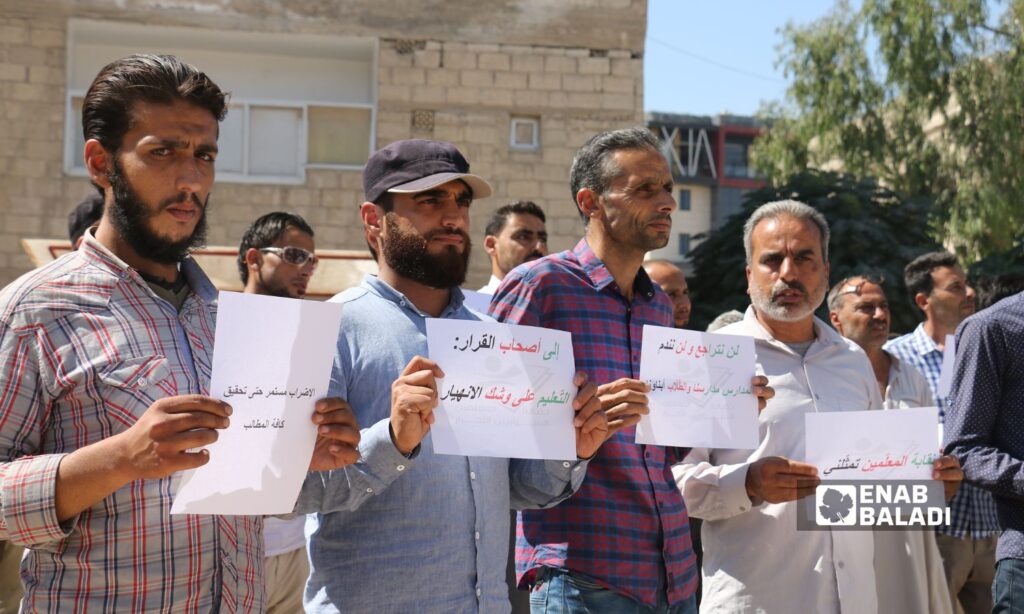Enab Baladi – Aleppo countryside
Teachers in many cities and towns in the northern and eastern Aleppo countryside organized protest sit-ins that carried several demands in conjunction with a strike in several schools since the beginning of this September.
The cities of Azaz, al-Bab, al-Rai, and Akhtarin witnessed protests by male and female teachers who demanded an increase in salaries and monthly wages and improved conditions of the educational process, rejecting partial solutions provided to them in the form of food baskets or clothing vouchers.
The strike continues pending a response by stakeholders in local councils and the Ministry of Education in the Syrian Interim Government (SIG), which controls the region.
Salaries that do not allay hunger
Mohammad al-Yassin, an Arabic language teacher in a middle school in the city of Azaz, in the northern countryside of Aleppo, explained through an email to Enab Baladi that the strike was not the teachers’ demand or goal until after they reached the stage of “starvation, humiliation, and degradation” when facing their children.
Children during a protest sit-in to respond to the demands of teachers to raise the monthly income and improve the educational process in the city of Azaz in the northern countryside of Aleppo – 15 September 2022 (Enab Baladi / Dayan Junpaz)
Al-Yassin demanded a salary that “preserves the dignity of the teacher in front of the grocery owner,” stating that the salary is only 60 US dollars (1100 Turkish liras) and is not sufficient to secure the family’s minimum needs.
While al-Yassin held the local council and stakeholders administering the area, who did not respond to their demands, accountable, teachers were held responsible for the strike and its negative consequences.
Hamza Mohammad Barbouri, a teacher at a school in the city of Azaz, explained in an email that he sent to Enab Baladi that teachers’ needs were twice as high as their monthly income, pointing out that he could not provide the most basic needs of his family, such as food, clothing, and fuel.
The weakest of employee categories
Teacher Barbouri said that teachers’ deteriorating situation in the region puts them in front of two options, either working a second job with long and exhausting hours or leaving their teaching jobs. Dozens of teachers had made the second choice, he noted.
A protest sit-in to respond to the teachers’ demands to raise the monthly income and improve the educational process in the city of Azaz in the northern countryside of Aleppo – 15 September 2022 (Enab Baladi / Dayan Junpaz)
Barbouri wondered how teachers can develop the educational process, take care of the student, communicate with parents, devote themselves to their duties and cultivate noble moral values while they are preoccupied with how to secure their families’ most basic necessities.
The teacher is considered to be one of the weakest categories of employees in terms of monthly salary in comparison with employees at the health, security, military, and relief institutions and in terms of allocated aid, according to Barbouri.
The idea of the unorganized and random strike is an absurd idea with ill-considered results, according to Barbouri, who drew attention to the need for a time plan for a strike and a thoughtful, far from random, advance preparation by teachers to obtain positive results that serve the teacher and the educational process, and avoid harm to students.
The teacher called, in the event of the demands being met, that the value of salary raises be rewarding and commensurate with the living situation and the soaring prices in the region and that the increase should not be “illusory.”
Enab Baladi contacted the Director of Education in the city of Azaz via email but did not receive an answer until the moment of editing this report.
Enab Baladi’s correspondent in the northern countryside of Aleppo tried to meet the responsible authorities in Azaz’s Directorate of Education, but they refused to make any statement.
Previous protests, persisting demands
The protests are not a novelty. For months now, there have been repeated strikes, sit-ins, and demonstrations organized by teachers in Aleppo’s northern and eastern countryside.
There have also been some demonstrations against administrative corruption in the region, the deterioration of the educational process, and the “chaos of arms.”
Last March, several cities in the countryside of Aleppo witnessed a strike by several schools, denouncing security chaos, spreading militarism, and unattended weapons in front of school gates.
Teachers’ protests in SIG-held areas in the northern and eastern countryside of Aleppo and the cities of Ras al-Ain and Tal Abyad began on 14 October 2021, demanding raised salaries, whose value had declined with the deterioration of the Turkish lira.
Teachers in these areas used to be paid 500 Turkish liras before they protested against it in October 2018, after which it was raised to 750 Turkish liras.
The Turkish lira is declining in value against the US dollar, according to the Döviz website specializing in exchange rates and currencies.
Despite the announcement by local councils operating in the region to raise the salaries of employees and workers in all sectors in December 2021 by 40%, demonstrations continued at a varying pace amid numerous promises to meet protesters’ demands.
The salary of a single schoolteacher increased from 700 to 1000 Turkish liras, while a married teacher’s salary went from 750 to 1100 Turkish liras.

